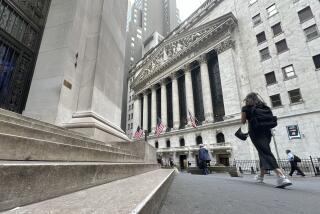Dow Sheds 12 in Selloff; Bond Yields Also Dip : Market Overview
- Share via
An accelerated selloff in small stocks after weeks of gains knocked the stock market lower.
* Interest rates fell on Treasury bonds, even though positive economic news floated through the market.
Credit
Stocks opened mixed in choppy trading. But they turned decisively lower around midday and declined steadily, pressured by a late round of computer-triggered selling. But prices still managed to close above their session lows.
The Dow Jones industrial average, which lost 27 points on Monday, shed another 12.42 points to close at 3,193.32.
Declining issues outnumbered gaining by about 5 to 4 on the New York Stock Exchange.
Big Board volume totaled 187.66 million shares, up from 175.31 million the day before.
The worst losses were felt among secondary issues, which have rallied for more than a month and were ripe for profit taking, analysts said.
Among them, health care and technology stocks were hit particularly hard. Word that Borland International pledged to keep pace with Microsoft in software pricing sparked fears of a price war.
* Over-the-counter software stocks plunged. Borland lost 4 to 24 3/4; Microsoft was off 2 3/4 at 90, and Lotus Development fell 1 3/4 to 19 1/2.
* Tokos Medical, which said it would earn less than analysts have estimated in the fourth quarter, lead health care stocks downward. It plummeted a steep 8 1/2 to 16 1/8.
Analysts said many investors have headed to the sidelines, as indicated by a lightening in volume in recent days. Several observers said the post-election euphoria has worn off, and market players are now waiting to see just what changes are in store under President-elect Bill Clinton.
Among the market highlights:
* Blockbuster Entertainment, which announced expansion plans on Monday, was unchanged at 17. Tyco Toys, recommended by an analyst, rose 3/8 to 14 3/8; Arkla Inc., which said it will sell a unit for $402 million and divest other operations to reduce debt, rose 3/8 to 9 5/8. Elsewhere, IBM was down 5/8 to 64 1/4; Philip Morris rose 1/2 to 79 7/8; AT&T; was off 3/4 at 45 7/8, and General Motors lost 1/2 to 30 5/8.
* British Air, which reported disappointing quarterly earnings, fell 2 7/8 to 37 3/4. Other airline stocks also declined, including Delta, down 1 1/4 to 52 and UAL Corp., which lost 1 3/4 to 117 1/8.
* Japanese electronics giant Matsushita, which also reported lower profit and said there is no reason to expect a rebound in the near future, lost 2 1/2 to 83 1/2.
Overseas, stocks extended their losing streak in Tokyo, with the 225-share Nikkei average dropping 169.51 points to 15,993.48.
In Frankfurt, shares closed mixed, with the 30-share DAX average losing 1.90 points to close at 1,545.05.
On the London stock exchange, the Financial Times 100-share average closed 0.4 points higher at 2,679.2.
Credit
The yield on the Treasury’s main 30-year bond was 7.53%, down from 7.56% late Monday. Its price, which rises when yields fall, rose 5/16 point, or $3.13 per $1,000 in face amount.
John V. Sebastian, an executive vice president with Clayton Brown & Associates in Chicago, said the bond market was apparently reacting to a two-day decline in stock prices.
Sebastian added that the Johnson Redbook report, showing that national retail sales for the first two weeks of November were up 5.6% over last year, apparently was not having the adverse effect that positive economic news tends to have on the Treasury bond market.
Positive economic news usually sends bond prices down because it lessens chances that the Federal Reserve Board will lower interest rates to stimulate the economy. Lower rates increase the value of existing bonds.
The federal funds rate, the interest on overnight loans between banks, fell to 3%, down from 3.25% late Monday.
Currency
The dollar’s recent rally stalled in the absence of fresh economic news.
The dollar has been rising in recent weeks after reports that indicate a slow improvement in the economy. Retail sales, industrial production and the nation’s money supply have all perked up in recent days.
The dollar has been strengthening against the German mark in recent sessions. The mark weakened Monday after five leading German economists predicted zero growth in western Germany’s economy next year, said Andrew Hodge, vice president at Bank Brussels Lambert.
Hodge said the dollar failed to break a key level of about 160.70 marks during the session because of technical barriers. The dollar closed at 1.592 German marks in late New York trading, up from 1.5915 late Monday.
The greenback closed at 124.35 Japanese yen, down from 124.70 yen on Monday.
Commodities
Corn futures prices surged to the highest level in more than seven weeks after the government reported that the harvest is still lagging far behind the normal pace.
Corn for December delivery rose 4.75 cents to $2.158 a bushel, the highest settlement of a near-term contract since Sept. 25. Commodity funds were huge buyers, analysts said.
Meanwhile, oil futures fell moderately on the New York Mercantile Exchange after a strong rally on Monday. Light, sweet crude oil for December delivery fell 11 cents to $20.26 a barrel.
Gold closed up 40 cents at $334.30 an ounce, and silver gained 0.6 cent to finish at $3.758 an ounce.
More to Read
Inside the business of entertainment
The Wide Shot brings you news, analysis and insights on everything from streaming wars to production — and what it all means for the future.
You may occasionally receive promotional content from the Los Angeles Times.










